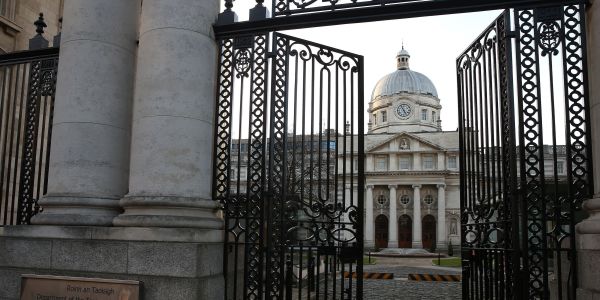Ireland will celebrate the centenary of its Easter Rising, which led to independence from British rule, without a government, former Taoiseach Bertie Ahern has forecast.
Political leaders are scrambling to find allies to form a new administration after one of the most indecisive general election outcomes of recent times.
With just a clutch of seats to be decided, the two main political parties are coming under intense pressure to set aside their age-old enmity and forge an unprecedented alliance as confusion reigns about the way forward.
But ex-Fianna Fail leader Mr Ahern ruled out his party entering a coalition with arch-rivals Fine Gael, predicting a minority government which will not be agreed upon for at least another month.
“There is no way, in my view, that this is going to be resolved before Easter. People can forget that,” he said.
A massive voter schism after last Friday’s poll comes amid national celebrations of the 1916 rebellion, a seminal moment in Irish history which ultimately led to partition and the creation of both the Republic of Ireland and Northern Ireland.
The rising was followed by a bitter civil war, with the country’s two main parties being born out of the opposing sides.
Despite pressure mounting on the pair to come together to form a “grand coalition” that would restore stability, Mr Ahern said a union was unlikely to work.
“It’ll come down to a combination, that there are a group of parties, maybe two parties, but a group of parties who are prepared to support a Taoiseach. I think that will happen,” he said.
“That government will be a minority government clearly because it won’t have the numbers but it’ll have sufficient support from outside.”
He also ruled out the prospect of a re-run of the election.
“Politicians are exhausted, they’ve spent a lot of money, their workers have taken leave, they won’t want a 2016 election,” he said.
“Some way will be found to make sure it’s not 2016.”
Taoiseach Enda Kenny is to meet his party leadership while Fianna Fail chief Micheal Martin will open talks this week with his own stalwarts about their limited options.
Fractures have already opened within both parties, who have swapped power for decades, about doing a deal with the old enemy.
Counting continues today, under the complex and lengthy proportional representation system, for a small number of final seats yet to be decided.
Recounts have also been ordered in a handful of constituencies.
Fine Gael looks set to be the largest party despite suffering humiliating losses after five years in power implementing austerity, taking a narrow lead over Fianna Fail.
Outgoing junior coalition partner Labour has taken a drubbing with a number of its ministers being ejected, although party leader Joan Burton and deputy leader Alan Kelly won fights to retain their seats.
Ms Burton said she did not see her party in the next government.
Sinn Fein has further increased its vote south of the border, making it the third largest. Gerry Adams’ party said it would not prop up either of the two traditional parties.
With a large section of the electorate backing smaller parties and independents, the make-up of a new government remains in doubt, if an administration can be formed at all.
Such is the uncertainty, senior political figures have talked openly about a new political system, citing continental European-style consensual arrangements or even a power-sharing executive similar to Northern Ireland.
Among the battered coalition’s biggest casualties were 10 serving or ex-ministers, including Fine Gael’s deputy leader and former health minister James Reilly, the party’s former justice minister Alan Shatter and Labour’s communications minister Alex White.
